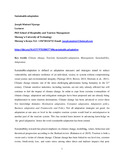| dc.description.abstract | Sustainable-adaptation is defined as adaptation measures and strategies aimed to reduce vulnerability and enhance resilience of an individual, society or system without compromising social justice and environmental integrity (Njoroge 2014; Brown, 2011; Ericksen et al., 2011). Climate change remains one of the most challenging phenomena facing humanity in the 21st century. Climate sensitive industries, including tourism, are not only already affected but will continue to feel the impact of climate change. In order to cope from extreme eventualities of climate change, adaptation and mitigation strategies have been proposed and are already being implemented in some tourism destinations. Climate change has been advanced to cover these five knowledge domains: Destination adaptation, Consumer adaptation, Adaptation policy, Business adaptation and Frameworks and Policy. Not all adaptation strategies are good. An adaptation at one area or level in the complex tourism system would lead to maladaptation in another part of the tourism system. This has created keen interest in advancing knowledge on ‘the good adaptation’ hence the word sustainable-adaptation has been coined.
Sustainability research has placed emphasis on climate change, modelling, values, behaviour and theoretical progression according to the Butland review (Ruhanen et al 2019). Tourism is both a vector and a victim of climate change. Climate change has been linked to sea level rise, extreme events, biodiversity loss, and water stress among other direct and indirect impacts that pose | en_US |

